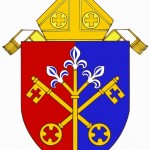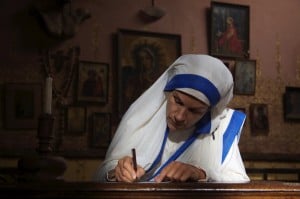
I understand that “tired” feeling. Lately, some days I’ve found myself wringing my hands [metaphorically speaking], indignant about something I’ve read on Facebook, heard on the radio, watched on TV.
“Why do I do this?” I mutter. I imagine myself freed from the daily grind—puttering in the garden, walking in the woods, curled up with a good book, but no longer engaging the culture at the level of confrontation and compromise. In other words, I think of retirement.
But I have a feeling that this yearning for denouement isn’t what has motivated Pope Benedict XVI, who shocked the world this morning by announcing his retirement from the papacy. Perhaps he is ill, and we will learn only after his passing that a diagnosis of debilitating disease prompted him to turn the reins over to his successor.
He is not, as some secular reporters have asserted, losing his ability to touch hearts and minds. One writer reported this morning that he had written only three encyclicals—but his trilogy on the life of Christ has been but a small portion of his published work. I looked back this morning to see what I’d written on this pontiff, and I saw a pope with a robust interest in the new evangelization, exemplified by his own entry into the world of social communications and his support for lay initiatives. He loved the youth, embraced converts, reached out to the people of his own native Germany and to the Irish, the faithful in Latin America. In 2008, enthusiastic followers filled Yankee Stadium during his U.S. visit. The establishment of the Ordinariate for former Anglicans; the efforts toward reunification with the SSPX; the drive for unity and orthodoxy and peace—these are only a few of the evidences for Pope Benedict’s continued relevance in a secularist world.

Dr. Scott Hahn offered an interesting perspective on what may have been a prophetic gesture on the part of Pope Benedict in 2009:
Back on April 29, 2009, Pope Benedict XVI did something rather striking, but which went largely unnoticed. He stopped off in Aquila, Italy, and visited the tomb of an obscure medieval Pope named St. Celestine V (1215-1296). After a brief prayer, he left his pallium, the symbol of his own episcopal authority as Bishop of Rome, on top of Celestine’s tomb!
Pope Celestine V is the medieval pope noted in the news today for having resigned from the papacy 600 years ago.
Dr. Hahn goes on to report that just fifteen months later, on July 4, 2010,
Benedict went out of his way again, this time to visit and pray in the cathedral of Sulmona, near Rome, before the relics of this same saint, Celestine V.
Perhaps our Holy Father was anticipating this day, planning for his eventual resignation as health concerns crowded out events on the papal calendar. It has been reported that the pope’s physician recently told him that he should no longer travel internationally.
I was in his holy presence at least twice in recent memory:
 With my husband and son, I attended the Mass in Yankee Stadium in April 2008, surrounded by the faithful followers of Jesus Christ and his successor, Pope Benedict.
With my husband and son, I attended the Mass in Yankee Stadium in April 2008, surrounded by the faithful followers of Jesus Christ and his successor, Pope Benedict.
And earlier—on September 28, 2004, while traveling with Legatus—it was my privilege to attend a Mass in St. Peter’s Basilica commemorating the 25th anniversary of the deaths of the Supreme Pontiffs Paul VI and John Paul I. The celebrant was Pope John Paul II; but by that time the pope was too infirm to stand at the altar through the long high mass; so JPII was seated on a chair in front of the altar while represented by his chosen delegate, then-Cardinal Joseph Ratzinger, Dean of the College of Cardinals. The cardinal most certainly knew firsthand of the rigors of the papacy, and the toll which the office had taken on his friend Pope John Paul II.
It’s difficult to know why now, at this time, Pope Benedict has deemed it necessary to pass the responsibility for leadership of Christ’s Church to another. Certainly his body has slowed with the passage of time; but his brilliant mind continues to generate words which inspire and guide. The decision, though, is his; and apparently, he feels that now is the time to step into history and spend his last years in quiet prayer and study.
Dear Papa Benedict, we love you and we will miss you. May God bless you, and may He enliven the upcoming Conclave with His wisdom and His grace. May He bless the next successor of St. Peter with wisdom to lead His people into the future. Amen.











